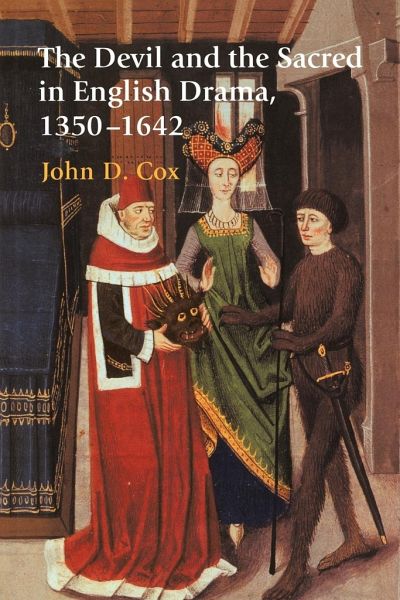
The Devil and the Sacred in English Drama, 1350 1642
Versandkostenfrei!
Versandfertig in 1-2 Wochen
53,99 €
inkl. MwSt.

PAYBACK Punkte
27 °P sammeln!
This book is a history of stage devils in early English drama.John Cox tells the intriguing story of stage devils from their earliest appearance in English plays to the closing of the theatres by parliamentary order in 1642. The book represents a major revision of E. K. Chambers' ideas of stage devils in The Medieval Stage (1903), arguing that this is not a history of gradual secularization, as scholarship has maintained for the last century, but rather that stage devils were profoundly shaped from the outset by the assumptions of sacred drama and retained this shape virtually unchanged until ...
This book is a history of stage devils in early English drama.
John Cox tells the intriguing story of stage devils from their earliest appearance in English plays to the closing of the theatres by parliamentary order in 1642. The book represents a major revision of E. K. Chambers' ideas of stage devils in The Medieval Stage (1903), arguing that this is not a history of gradual secularization, as scholarship has maintained for the last century, but rather that stage devils were profoundly shaped from the outset by the assumptions of sacred drama and retained this shape virtually unchanged until the advent of permanent commercial theatres near London. The book spans both medieval and Renaissance drama including the medieval Mystery cycles on the one hand, through to plays by Greene, Marlowe, Shakespeare (1 and 2 Henry VI), Jonson, Middleton and Davenant. An appendix lists all known devil plays in English from the beginning to 1642.
Review quote:
"...Professor Cox convincingly reevaluates the role of the Devil in early drama and establishes this evil character as in opposition to the social and religious good - in other words, as embodying a function of perversity to fit all situations."
The Early Drama, Art, and Music Review
"Cox is a careful and insightful reader of dramatic literature from mystery and morality plays through early Protestant drama to the flowering of the Renaissance stage... Valuable and thought-provoking."
Religion and Literature
"This is a good work and I wish I had been able to consult it for my own..."
Bibliotheque d' humanisme et Renaissance
"If you wanted to see a God-like figure nonetheless, the players are glad to provide, for a price, a distant, tantalizing glimpse."
Christianity and Literature
Table of contents:
List of illustrations; Acknowledgments; Introduction; 1. Stage devils and oppositional thinking; 2. The devil and the sacred in the English mystery plays; 3. Stage devils and sacramental community in non-cycle plays; 4. Stage devils and early social satire; 5. Protestant devils and the new community; 6. The devils of Dr Faustus; 7. Reacting to Marlowe; 8. The devil and the sacred on the Shakespearean stage: theatre and belief; 9. Traditional morality and magical thinking; 10. New directions; Appendix: devil plays in English, 1350-1642; Notes; Index.
John Cox tells the intriguing story of stage devils from their earliest appearance in English plays to the closing of the theatres by parliamentary order in 1642. The book represents a major revision of E. K. Chambers' ideas of stage devils in The Medieval Stage (1903), arguing that this is not a history of gradual secularization, as scholarship has maintained for the last century, but rather that stage devils were profoundly shaped from the outset by the assumptions of sacred drama and retained this shape virtually unchanged until the advent of permanent commercial theatres near London. The book spans both medieval and Renaissance drama including the medieval Mystery cycles on the one hand, through to plays by Greene, Marlowe, Shakespeare (1 and 2 Henry VI), Jonson, Middleton and Davenant. An appendix lists all known devil plays in English from the beginning to 1642.
Review quote:
"...Professor Cox convincingly reevaluates the role of the Devil in early drama and establishes this evil character as in opposition to the social and religious good - in other words, as embodying a function of perversity to fit all situations."
The Early Drama, Art, and Music Review
"Cox is a careful and insightful reader of dramatic literature from mystery and morality plays through early Protestant drama to the flowering of the Renaissance stage... Valuable and thought-provoking."
Religion and Literature
"This is a good work and I wish I had been able to consult it for my own..."
Bibliotheque d' humanisme et Renaissance
"If you wanted to see a God-like figure nonetheless, the players are glad to provide, for a price, a distant, tantalizing glimpse."
Christianity and Literature
Table of contents:
List of illustrations; Acknowledgments; Introduction; 1. Stage devils and oppositional thinking; 2. The devil and the sacred in the English mystery plays; 3. Stage devils and sacramental community in non-cycle plays; 4. Stage devils and early social satire; 5. Protestant devils and the new community; 6. The devils of Dr Faustus; 7. Reacting to Marlowe; 8. The devil and the sacred on the Shakespearean stage: theatre and belief; 9. Traditional morality and magical thinking; 10. New directions; Appendix: devil plays in English, 1350-1642; Notes; Index.




